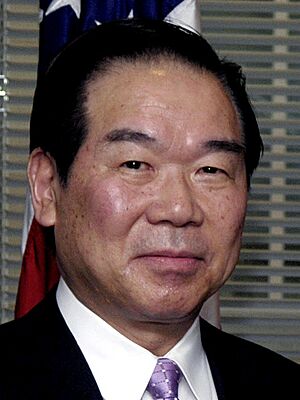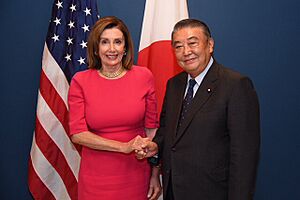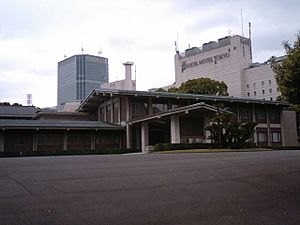Speaker of the House of Representatives (Japan) facts for kids
Quick facts for kids Speaker of the House of Representatives |
|
|---|---|
| House of Representatives | |
| Style | Mr. Speaker (informal) The Honourable (formal) |
| Residence | The Speaker’s Official Residence (not in use) |
| Appointer | The House |
| Term length | Four years; renewable only if there is a dissolution |
| Constituting instrument | Constitution of Japan |
| Formation | November 29, 1890 |
| Deputy | Vice Speaker of the House of Representatives (衆議院副議長 Shūgiin-fukugichō) Banri Kaieda (since 10 November 2021) |
The Speaker of the House of Representatives (called Shūgiin-gichō in Japanese) is a very important leader in Japan's government. They are in charge of the House of Representatives, which is like one half of Japan's parliament. Along with the President of the House of Councillors, the Speaker helps lead the part of the government that makes laws.
Members of the House choose the Speaker at the start of each new session. A Speaker can serve for up to four years. The person currently holding this important job is Fukushiro Nukaga. He started his role on October 20, 2023.
Contents
How the Speaker is Chosen
The Speaker is chosen on the very first day of a new session of the House. The Secretary-General of the House helps manage this election. Members vote secretly, and the person who gets more than half of the votes wins.
If no one gets enough votes, the two candidates with the most votes have another election. If they get the same number of votes, the winner is chosen by drawing lots, which is like a lottery! The Vice Speaker, who helps the Speaker, is chosen in the same way, but in a separate vote.
Usually, the Speaker is an experienced member from the main ruling political party. The Vice Speaker is usually an experienced member from the main opposition party. This helps make sure both sides of politics are represented in these important roles.
What the Speaker Does
The Speaker has many important jobs. They must keep order in the House of Representatives during meetings. They also help organize the work of the House and oversee how it is run. The Speaker also represents the entire House to other parts of the government and to other countries.
The Speaker has special powers to keep things orderly during debates. If needed, they can ask the police to help. These police officers then follow the Speaker's directions. The Speaker can even order a member of the House or a visitor to be arrested or removed if they are causing trouble.
If a member of the House is being disruptive, the Speaker can warn them or tell them to take back what they said. If the member still doesn't listen, the Speaker can stop them from speaking or make them leave the meeting until it's over. If the meeting becomes too wild and out of control, the Speaker can even stop the meeting for a short time or end it for the day.
Past Speakers of the House
Many important people have served as Speaker of the House of Representatives since it was first created in 1890. Here are a few examples, including the first Speaker and the most recent ones:
| Speaker | Political party | Term start | Term end | ||
|---|---|---|---|---|---|
| Imperial Diet 1890–1947 |
|||||
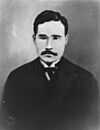 |
Nobuyuki Nakajima Rep for Kanagawa–5th (1846–1899) |
Rikken Jiyūtō | November 26, 1890 | December 25, 1891 | |
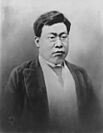 |
Hoshi Tōru Rep for Tochigi–1st (1850–1901) |
Rikken Jiyūtō | May 3, 1892 | December 13, 1893 | |
| National Diet 1947–present |
|||||
 |
Hiroyuki Hosoda Rep for Shimane–1st (1944–2023) |
Liberal Democratic | November 10, 2021 | October 20, 2023 | |
 |
Fukushiro Nukaga Rep for Ibaraki–2nd (born 1944) |
Liberal Democratic | 20 October 2023 | Incumbent | |
Past Vice Speakers of the House
The Vice Speaker also plays a very important role, helping the Speaker and stepping in when the Speaker is not available. Here are some examples of people who have served as Vice Speaker:
| Vice speaker | Political party | Term start | Term end | ||
|---|---|---|---|---|---|
| Imperial Diet 1890–1947 |
|||||
 |
Tsuda Mamichi Rep for Tokyo–8th (1829–1903) |
Taiseikai | November 26, 1890 | December 25, 1891 | |
 |
Sone Arasuke Rep for Yamaguchi–4th (1849–1910) |
Chuo Club | May 3, 1892 | August 31, 1893 | |
| National Diet 1947–present |
|||||
 |
Hirotaka Akamatsu Rep for Aichi–5th (born 1948) |
Constitutional Democratic | November 1, 2017 | October 14, 2021 | |
 |
Banri Kaieda Rep for Tokyo PR block (born 1949) |
Constitutional Democratic | November 10, 2021 | Incumbent | |
 | James Van Der Zee |
 | Alma Thomas |
 | Ellis Wilson |
 | Margaret Taylor-Burroughs |


